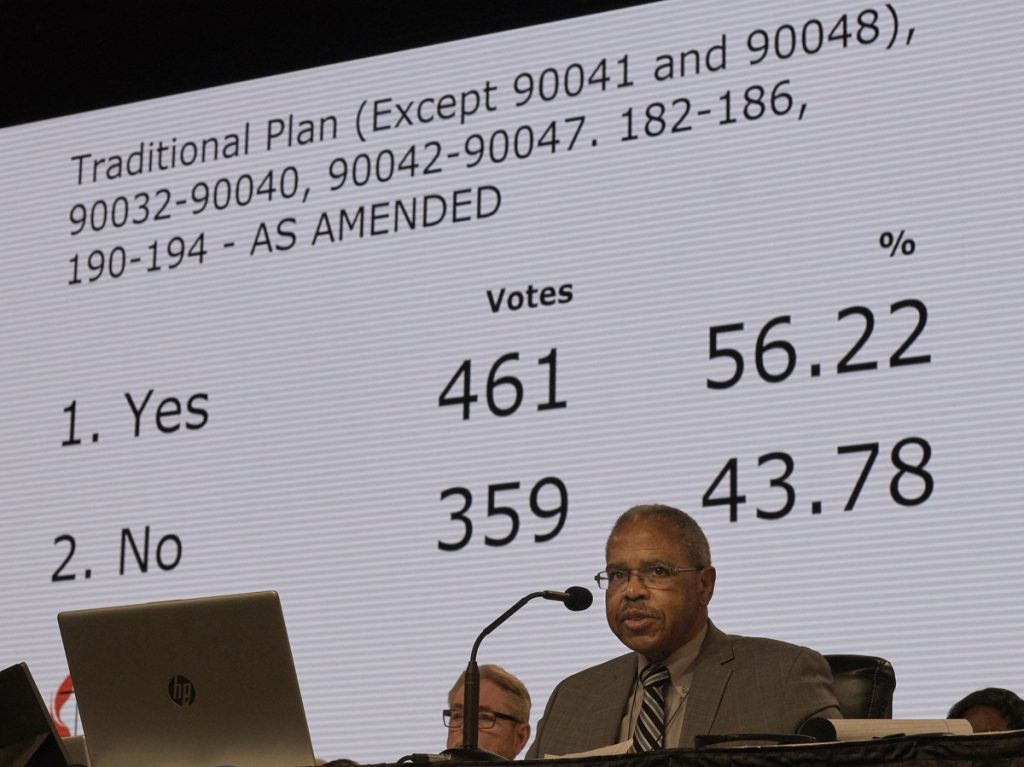The Judicial Council of the United Methodist Church, meeting from April 23-26 in Evanston, Illinois, has decided that much of the so-called Traditional Plan, which the General Conference adopted at its most recent meeting in February, is constitutional.
The United Methodist Church’s top court has found that while some provisions of the newly adopted Traditional Plan remain unconstitutional, the rest of the plan is valid as church law.
That was the Judicial Council’s ruling on a requested review of the Traditional Plan, which was approved during a special denomination-wide legislative session in February to strengthen enforcement of bans on “self-avowed practicing” gay clergy and same-sex weddings.
In a separate ruling, legislation to provide an exit strategy for local churches wishing to leave the denomination meets three minimum requirements and thus is constitutional “when taken together with the consent of the annual conference” as specifically outlined in the Book of Discipline, the court said.
The decision itself is a lengthy and technical one. It finds unconstitutional the parts of the Traditional Plan which require annual conferences to submit certifications that none of their elected leaders are “self-avowed, practicing homosexuals,” and which would also require respondents to disciplinary complaints to promise not to repeat their actions. At the same time, the decision upholds the ban on both the ordination of LGBTQIA individuals as elders or bishops and the ban on UMC clergy performing same-sex weddings.
Petition 90036 prohibits bishops from consecrating bishops who are self-avowed homosexuals, even those elected by a jurisdictional or central conference. It also prohibits bishops from commissioning or ordaining those determined to be self-avowed homosexuals, even if recommended and approved by the clergy session or board of ordained ministry.
Petition 90042 sets mandatory penalties for pastors convicted by a trial court of performing same-sex wedding ceremonies or conducting ceremonies to celebrate homosexual unions. Those penalties are a year’s suspension without pay for the first offense and termination of conference membership and church credentials for a second offense.
Petition 90043 prohibits the recommendation or approval of any person who does not meet the ordination qualifications found in Paragraph 304.1-3 [of the Book of Discipline, the UMC’s equivalent to the Episcopal Constitution and Canons]. That section includes the language that “homosexuality is incompatible with Christian teaching” and that “self-avowed practicing homosexuals” cannot be certified as candidates for ministry, ordained or appointed.
Included in the Judicial Council’s decision is the groundwork for a mechanism which can be used by parishes wishing to disaffiliate from the UMC.
… [the Judicial Council] has now determined that any General Conference legislation permitting such an exit must meet three minimum requirements:
- Approval of the disaffiliation resolution by a two-thirds majority of the professing members of the local church present and voting at the church conference.
- Establishment of the terms and conditions, including the effective date, of the agreement between the annual conference and the exiting local church by the conference board of trustees in accordance with applicable church law and civil laws.
- Ratification of the disaffiliation agreement by a simple majority of the members of the annual conference present and voting
The Traditional Plan is set to take effect in North America on January 1, 2020. Other provinces will have 12 months after the next General Conference meets in May of 2020 to implement the plan.

